
One of the key shared skills a high-performing team must possess is the ability to listen well – to each other, to stakeholders, customers, clients, and themselves. When my colleague, Alyson Keller, and I deliver the Ways of Working team coaching programme, we often include a workshop focusing on “Listening to Learn.” This blog explains why we believe this skill is crucial for teams to focus on, the conversations and activities we engage in during team coaching workshops, and the work individuals and teams need to do to develop their ability to listen deeply so they can learn effectively.
What is listening to learn?
Listening to Learn goes beyond mere hearing. It’s an active, intentional process where the listener seeks to understand, empathise, and gain new insights from the speaker. This type of listening involves:
- Full attention and presence
- Suspending judgment and preconceptions
- Asking clarifying questions
- Reflecting on what’s being said
- Seeking to understand not just the words, but the emotions and intentions behind them
Listening to Learn is a key component of what’s known as Generative Dialogue. This is a form of conversation that moves beyond debate or discussion to create new understanding and possibilities. In Generative Dialogue, participants listen deeply to each other, build on each other’s ideas, and collectively create insights that no individual could have arrived at alone.

The Power of Deep Listening
This quote from John O’Donohue beautifully captures the transformative power of deep listening and meaningful conversation:
“When is the last time that you had a great conversation? A conversation which wasn’t just two intersecting monologues, which is what passes for conversation a lot in this culture. When had you last a great conversation in which you overheard yourself saying things which you never knew you knew? That you heard yourself receiving from somebody words that absolutely found places within you that you thought you had lost? And a sense of an event of a conversation that brought the two of you onto a different plane? And fourthly, a conversation that continued to sing in your mind for weeks afterwards? Conversations like this are food and drink for the soul.”
John O’Donohue, 2007
Why listening to learn is important for teams
Clear Communication: Effective listening ensures messages are accurately received and understood, reducing misunderstandings and conflicts.
Relationship Building: Listening in a way that creates connection makes the speaker feel heard and accepted, fostering stronger interpersonal bonds within the team. As Amanda Blake notes in “Your Body is Your Brain,” this kind of attunement is “one of the truest, deepest experiences of connection we can have.”
Trust Building: When team members feel truly heard, it builds trust and psychological safety, essential for high-performing teams. James Kouzes and Barry Posner, in “The Leadership Challenge,” emphasize that “listening to build trust” is a crucial leadership skill.
Finding Common Purpose: Through deep listening, teams can uncover shared values and goals, aligning their efforts more effectively. Kouzes and Posner also highlight “listening to find common purpose” as a key leadership practice.
Receiving Feedback: Listening skills are crucial when receiving feedback, allowing team members to grow and improve without becoming defensive. As Wendy Palmer and Janet Crawford note in “Leadership Embodiment,” “Centered Listening helps you to receive feedback more skillfully and gracefully.”
Fostering Innovation and Creativity: When team members truly listen to each other, it creates a dialogue where new ideas can emerge and evolve. Peter Hawkins, in his book “Leadership Team Coaching,” advises teams to “get all the different perspectives, hopes and fears out on the table, and make sure they are all heard before we explore ways forward.”
Navigating Tension and Conflict: Effective listening skills help teams work through inevitable conflicts constructively, turning potential discord into opportunities for growth and understanding.
Expanding Perspectives: Adam Grant, in “Think Again: The Power of Knowing What You Don’t Know,” points out that “Listening can encourage others to reconsider their stance toward us, but it also gives us information that can lead us to question our own views about them.”
The areas in the list above are often focus areas of our Ways of Working team coaching programme.

The Art of Deep Listening
Berger and Fitzgerald, in their white paper “Coaching for Complexity” (2015), offer valuable insights on deep listening:
- Put your sense of certainty on hold before beginning a conversation.
- Intentionally listen for things that surprise or unsettle you rather than reflexively resisting new ideas.
- Pay attention to whom you listen. Try listening well to those you’ve discounted or written off.
They suggest asking yourself:
- Who have I written off as uninteresting or unmovable, and what could I learn by listening to that person rather than trying to tell them something?
- Which people or groups do I know little about, and how could I find out more?
- Whose perspective am I most certain about, and how could I be wrong?
Adam Grant emphasizes that “The right kind of listening motivates people to change.” He suggests practising “persuasive listening” by increasing your question-to-statement ratio and showing genuine interest in helping people crystallise their own views.
By incorporating these expert insights, we deepen our understanding of the critical role listening plays in team performance. Now we turn to provide concrete strategies for improving this essential skill.
Liberating Structures for enhancing listening skills
In our team coaching Ways of Working sessions, we use Liberating Structures (LS). These are easy-to-learn processes that enhance relational coordination and trust. They quickly foster lively participation in groups of any size, making it possible to truly include and unleash everyone. Here are some LS processes we might use to develop listening skills:

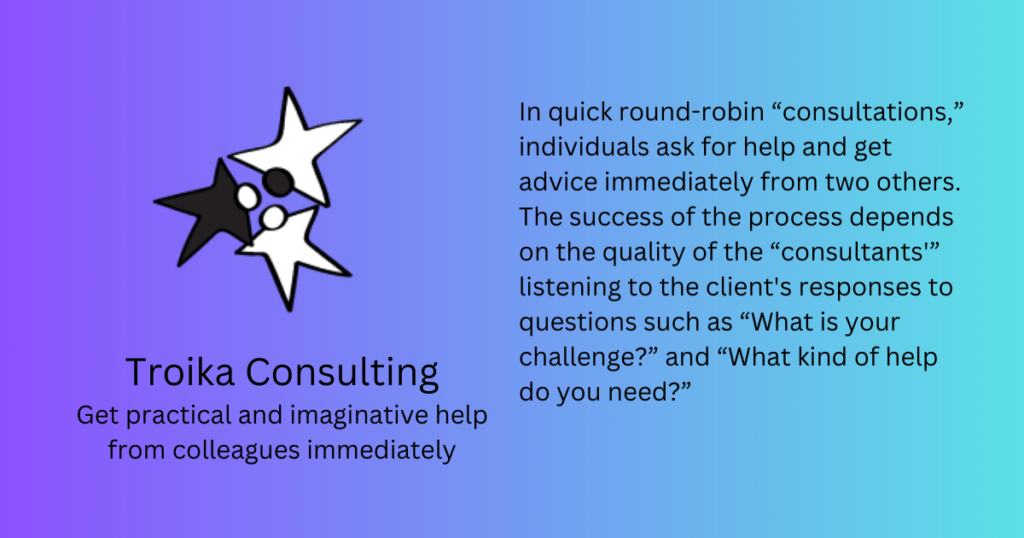
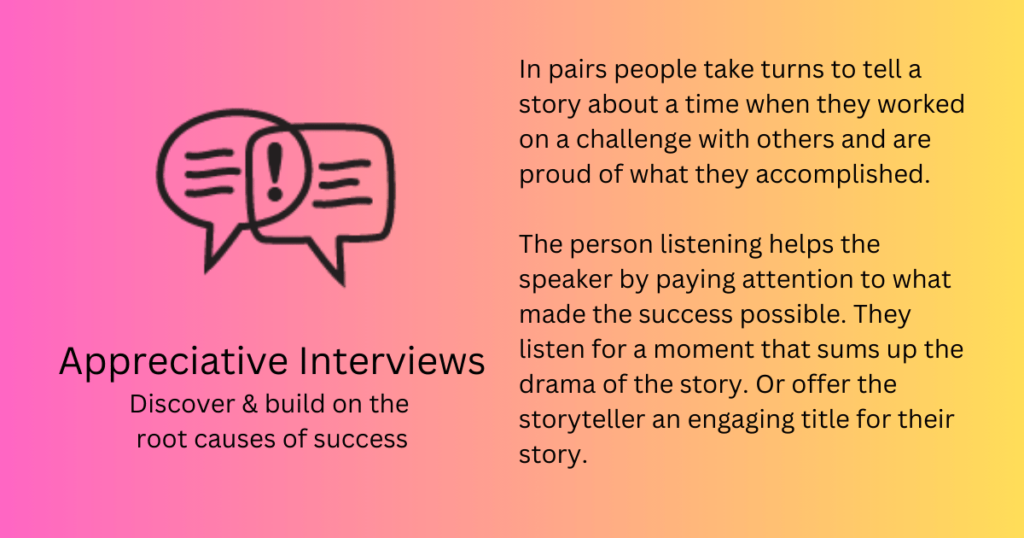
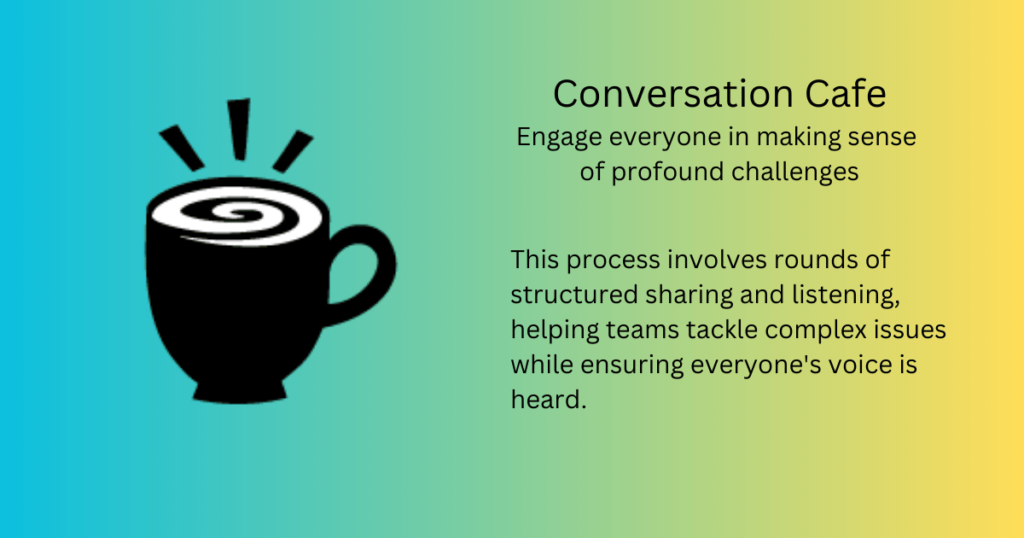
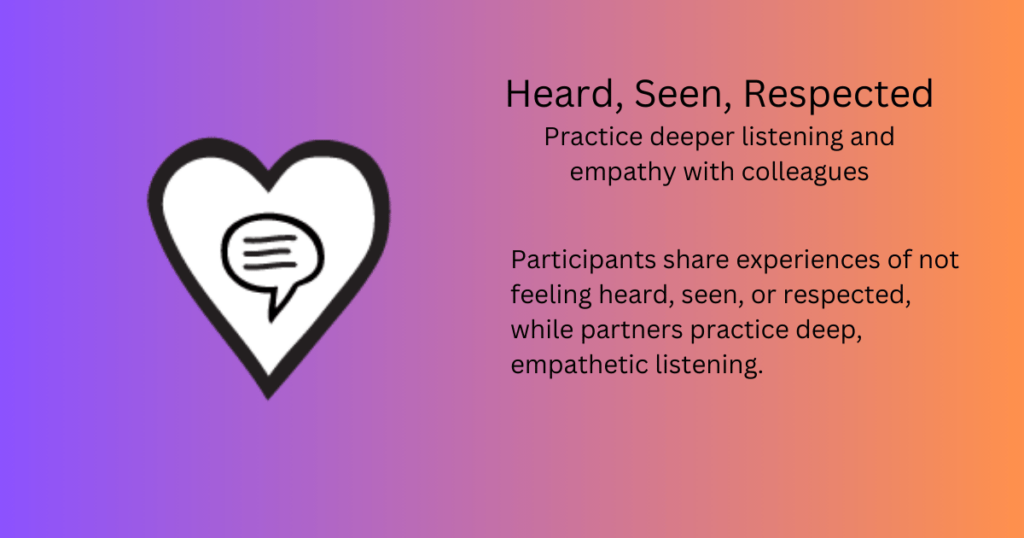
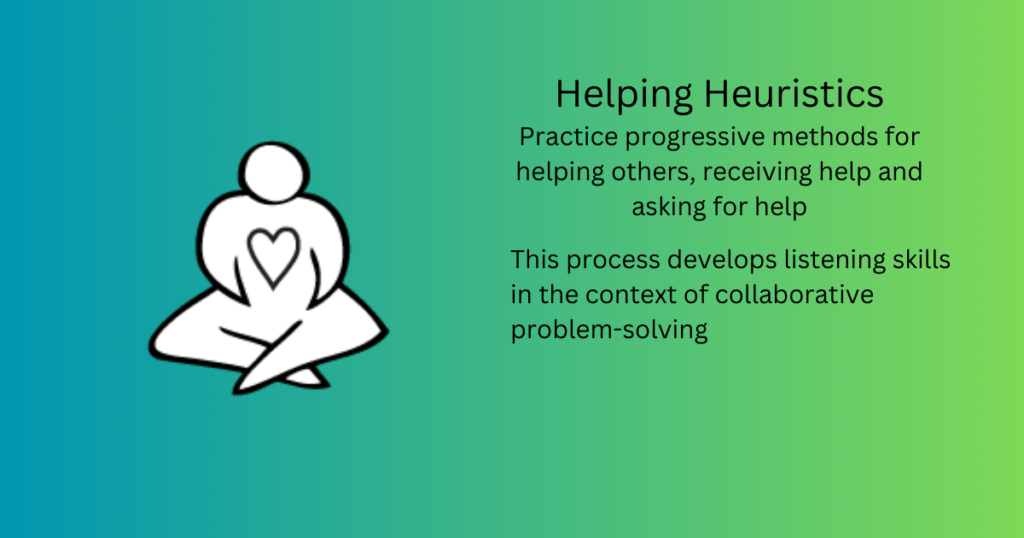
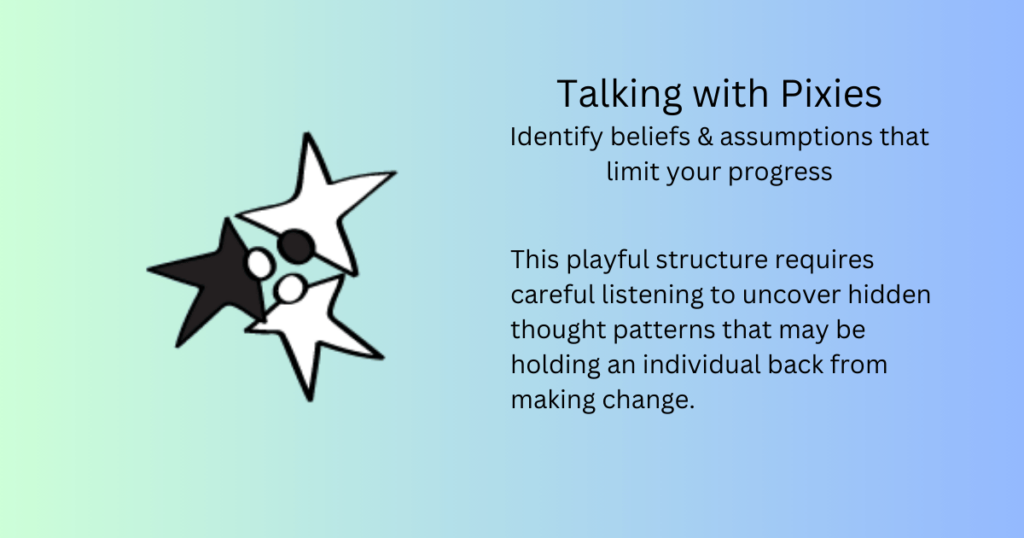
Although these brief descriptions may appear deceptively simple, you really need to experience them to appreciate how powerful, and fun, they are!
Individual Work to Develop Listening to Learn Skills
Develop a reflective practice: Regular reflection helps individuals become more aware of their thought patterns, biases, and emotional responses. This self-awareness is crucial for better listening.
Develop a mindfulness practice: Regular mindfulness practice can improve focus and present-moment awareness, essential for deep listening.
Practice active listening every day: Consciously apply active listening techniques in conversations with colleagues, friends, and family. Jon Wergin, in “Deep Learning in a Disorienting World,” emphasizes that “Active listening is the necessary first step to learning successfully with others.”
Seek feedback: Ask trusted colleagues or a coach for feedback on your listening skills and areas for improvement.
Keep a listening journal: Reflect on your listening experiences, noting challenges and breakthroughs.
Learn and practice Nonviolent Communication: This communication framework, developed by Marshall Rosenberg, emphasises empathy and can significantly enhance listening skills. A key aspect of NVC is listening for the underlying needs of the speaker, even when they’re not explicitly stated. By focusing on these unmet needs rather than just the words being said, listeners can develop a deeper understanding of the speaker’s perspective and motivations. This approach often leads to more compassionate and effective communication, as it addresses the root causes of conflicts or misunderstandings. Practising NVC can help team members become more attuned to each other’s needs, fostering a more supportive and collaborative team environment.
Cultivate Centered Listening: Wendy Palmer and Janet Crawford describe “Centered Listening” as an activity that includes what we hear, see, and sense. It involves listening for the whole, without taking it personally, and can tolerate not-knowing and not-understanding.

Practice Embodied Self-Awareness: Amanda Blake suggests developing the ability to pay full attention to both yourself and others simultaneously, creating a sense of attunement. I’ve taken up the Japanese martial art of aikido as a way of developing this practice.
Team Work to Develop Listening to Learn Skills
Incorporate Liberating Structures: Regularly use LS processes in team meetings to practice and reinforce good listening habits.
Establish listening ground rules: As a team, agree on guidelines for respectful, attentive listening during meetings and discussions.
Practice peer feedback on listening: Create opportunities for team members to give each other constructive feedback on their listening skills.
Conduct listening experiments: Try different listening techniques as a team and reflect on the outcomes.
Create a “Listening Culture”: Celebrate and recognize good listening behaviours to reinforce their importance.
Use technology mindfully: Establish norms around device usage in meetings to minimize distractions and promote focused listening.
Regular team reflection: Set aside time for the team to reflect on how well they’re listening to each other and stakeholders, and identify areas for improvement.
Active Learning: As David Day points out, “Development as an adult is active, not passive.” Encourage team members to actively practice new listening skills, especially those that take them out of their comfort zone.
Build Trust Through Listening: Harriette Thurber Rasmussen and Mohammed Raei, in “I’ll only follow if I trust you,” emphasize that “Listening denotes respect.” Consider how your team can demonstrate authentic listening to stakeholders, even when there’s disagreement.

Listening to Learn is a critical skill for high-performing teams
Listening to Learn is a critical skill for high-performing teams. It fosters clear communication, builds trust and relationships, uncovers shared purpose, enhances innovation, and helps navigate conflicts. Through structured processes like Liberating Structures and intentional individual and team practices, teams can significantly improve their listening skills.
In our Ways of Working team coaching programme, we place a strong emphasis on developing these crucial listening skills. We’ve seen firsthand how teams transform when they truly learn to listen – to each other, to their stakeholders, and to themselves. The result is not just better communication, but stronger relationships, more innovative solutions, and ultimately, higher performance.
If you’re interested in developing your team’s listening skills and overall performance, consider team coaching. The Ways of Working programme offers a tailored approach to help your team reach its full potential. Contact us to learn more about how we can help your team listen, learn, and excel together.
Remember, in the words of John O’Donohue, great conversations are “food and drink for the soul.” By developing your team’s ability to listen deeply and learn from each other, you’re not just improving performance – you’re enriching the very essence of your team’s working life.
Whakataukī on listening
Mā te rongo ka mōhio.
Mā te mōhio ka marama
Mā te marama ka matau
Mā te matau ka ora
From listening comes awareness.
From awareness comes understanding
From understanding comes knowledge
From knowledge comes life and wellbeing
Māori whakataukī / proverb
About the author
Alongside his experienced colleague, Alyson Keller from Performance Impact, David delivers the transformative Ways of Working Team Coaching Programme, empowering teams to unlock their full potential and drive organisational success.
References and Further Reading
- Bennett, D. (2024). Unlocking Team Potential: The Power of the Ways of Working Team Coaching Programme.
- Bennett, D. (2024). Tapping Into the Power of Decentralised Leadership
- Berger, J. G., & Fitzgerald, C. (2018). Coaching for an Increasingly Complex World.
- Blake, A. (2018). Your Body is Your Brain: Leverage Your Somatic Intelligence to Find Purpose, Build Resilience, Deepen Relationships and Lead More Powerfully. Embright, LLC.
- Day, D. V. (2024). Developing Leaders and Leadership: Principles, Practices, and Processes. Palgrave Macmillan
- O’Donohue, J. (2007). The Inner Landscape of Beauty. Interview with Krista Tippet , On Being podcast
- Grant, A. (2021). Think Again: The Power of Knowing What You Don’t Know. Viking.
- Hawkins, P. (2017). Leadership Team Coaching: Developing Collective Transformational Leadership (3rd ed.). Kogan Page.
- Kouzes, J. M., & Posner, B. Z. (2017). The Leadership Challenge: How to Make Extraordinary Things Happen in Organizations (6th ed.). Wiley.
- Lipmanowicz, H., & McCandless, K. (2013). The Surprising Power of Liberating Structures: Simple Rules to Unleash A Culture of Innovation. Liberating Structures Press. Liberating Structures website
- Palmer, W., & Crawford, J. (2013). Leadership Embodiment: How the Way We Sit and Stand Can Change the Way We Think and Speak. Create Space Independent Publishing Platform.
- Rasmussen, H. T., & Raei, M. (2021). I’ll only follow if I trust you: Using adult development to accelerate trust. In J. Reams (Ed.), Maturing Leadership: How Adult Development Impacts Leadership. Emerald Publishing Limited.
- Wergin, J. F. (2020). Deep Learning in a Disorienting World. Cambridge University Press.
